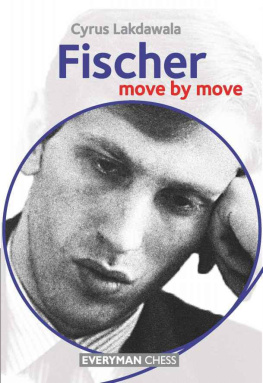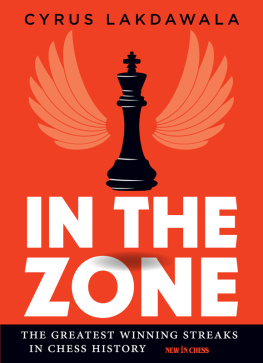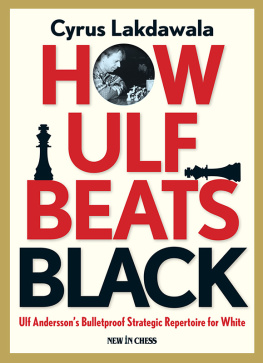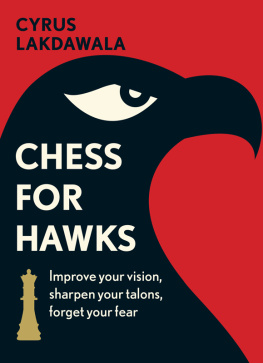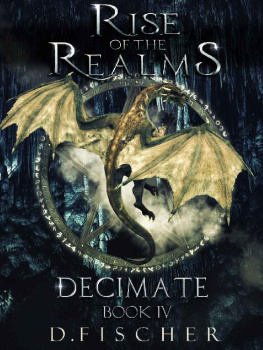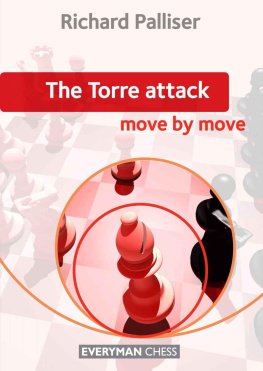Cyrus Lakdawala - Fischer Move by Move
Here you can read online Cyrus Lakdawala - Fischer Move by Move full text of the book (entire story) in english for free. Download pdf and epub, get meaning, cover and reviews about this ebook. publisher: Everyman Chess, genre: Detective and thriller. Description of the work, (preface) as well as reviews are available. Best literature library LitArk.com created for fans of good reading and offers a wide selection of genres:
Romance novel
Science fiction
Adventure
Detective
Science
History
Home and family
Prose
Art
Politics
Computer
Non-fiction
Religion
Business
Children
Humor
Choose a favorite category and find really read worthwhile books. Enjoy immersion in the world of imagination, feel the emotions of the characters or learn something new for yourself, make an fascinating discovery.
- Book:Fischer Move by Move
- Author:
- Publisher:Everyman Chess
- Genre:
- Rating:4 / 5
- Favourites:Add to favourites
- Your mark:
- 80
- 1
- 2
- 3
- 4
- 5
Fischer Move by Move: summary, description and annotation
We offer to read an annotation, description, summary or preface (depends on what the author of the book "Fischer Move by Move" wrote himself). If you haven't found the necessary information about the book — write in the comments, we will try to find it.
Fischer Move by Move — read online for free the complete book (whole text) full work
Below is the text of the book, divided by pages. System saving the place of the last page read, allows you to conveniently read the book "Fischer Move by Move" online for free, without having to search again every time where you left off. Put a bookmark, and you can go to the page where you finished reading at any time.
Font size:
Interval:
Bookmark:

First published in 2015 by Gloucester Publishers Limited, Northburgh House,
10 Northburgh Street, London EC1V 0AT
Copyright 2015 Cyrus Lakdawala
The right of Cyrus Lakdawala to be identified as the author of this work has been
asserted in accordance with the Copyrights, Designs and Patents Act 1988.
All rights reserved. No part of this publication may be reproduced, stored in a
retrieval system or transmitted in any form or by any means, electronic,
electrostatic, magnetic tape, photocopying, recording or otherwise,
without prior permission of the publisher.
British Library Cataloguing-in-Publication Data
A catalogue record for this book is available from the British Library.
ISBN Kindle:
978-1-78194-273-4
ISBN epub: 978-1-78194-274-1
Distributed in North America by National Book Network,
15200 NBN Way, Blue Ridge Summit, PA 17214. Ph: 717.794.3800.
Distributed in Europe by Central Books Ltd.,
99 Wallis Road, London E9 5LN. Ph 44(0)845 458 9911.
All other sales enquiries should be directed to Everyman Chess,
Northburgh House, 10 Northburgh Street, London EC1V 0AT
email: info@everymanchess.com; website: www.everymanchess.com
Everyman is the registered trade mark of Random House Inc. and is used in this work under licence from Random House Inc.
Everyman Chess Series
Chief advisor: Byron Jacobs
Commissioning editor: John Emms
Assistant editor: Richard Palliser
Typeset and edited by First Rank Publishing, Brighton.
Cover design by Horatio Monteverde.
Printed by TJ International Limited, Padstow, Cornwall.
About the Author
Cyrus Lakdawala is an International Master, a former National Open and American Open Champion, and a six-time State Champion. He has been teaching chess for over 30 years, and coaches some of the top junior players in the U.S.
Also by the Author:
Play the London System
A Ferocious Opening Repertoire
The Slav: Move by Move
1 ... d6: Move by Move
The Caro-Kann: Move by Move
The Four Knights: Move by Move
Capablanca: Move by Move
The Modern Defence: Move by Move
Kramnik: Move by Move
The Colle: Move by Move
The Scandinavian: Move by Move
Botvinnik: Move by Move
The Nimzo-Larsen Attack: Move by Move
Korchnoi: Move by Move
The Alekhine Defence: Move by Move
The Trompowsky Attack: Move by Move
Carlsen: Move by Move
The Classical French: Move by Move
Larsen: Move by Move
1 ... b6: Move by Move
Birds Opening: Move by Move
The Petroff: Move by Move
Contents
Bibliography
Bobby Fischer goes to War , David Edmonds and John Eidinow (Harper Perennial 2005)
Fischer/Spassky: The New York Times Report on the Chess Match of the Century , Richard Roberts, Harold Schonberg, Al Horowitz and Samuel Reshevsky (Quadrangle Books 1972)
Fischer: His Approach to Chess , Elie Agur (Cadogan Chess 1992)
How Fischer Plays Chess , David Levy (Fontana/Collins 1975)
How to Beat Bobby Fischer , Edmar Mednis (Bantam Books 1974)
Learn from Bobby Fischers Chess Games , Eric Schiller (Cardoza Publishing 2004)
My 60 Memorable Games , Bobby Fischer (Batsford 1969)
My Great Predecessors : volume IV , Garry Kasparov (Everyman Chess 2004)
Electronic Resources
ChessPublishing.com & Chess Today
Introduction
Im young, Im handsome, Im fast, Im pretty, and cant possibly be beat Muhammad Ali
Bobby Fischer, like Ali, grew bigger than his sport, and he bent our perceptions on how well a human can play chess. His life was one of legend, power, hubris and eventual self-destruction. More than any other great player, Fischers triumphs and falls plumbed the depth of human experience. He was simultaneously extraordinary and pathetic, and the inevitability of his fall was on par with the lives of Hamlet and Willie Loman. His is essentially a feel-bad story, of rags to riches, to borderline-crazy recluse.
The most dominant chess player who ever lived was born March 9th, 1943, in Chicago. Even as a child, Bobby lived his life with the supreme confidence of one who knows he is cut out for big things. I sense that he loved chess because it had the power to take him somewhere else, out of his deep, inherent unhappiness if only temporarily.
By the age of 14, he won the U.S. Championship, eight titles in all, each by a point or more. His 1963-1964 11-0 sweep of the championship may never be repeated. By age 15, Fischer qualified at Portoroz to become the youngest ever candidate for the world championship cycle. By 1970, he won the Palma de Mallorca Interzonal by an astounding 3.5 points ahead of his nearest competitor. By 1971 he was ranked number one in the world chess rankings. Then came his legendary match victories.
6-0, 6-Oh my God!
Victory breeds hatred, for the conquered is unhappy. The Buddha
First, Soviet GM Mark Taimanov fell by a typo-like 6-0 score. Many top players at the time interpreted this as an anomaly, of maybe Taimanov being horribly off form. Nobody expected Fischer to repeat this performance against the legendary GM Bent Larsen, then ranked equal 3rd/4th in the world. Yet Fischer did just that. If you just barely defeat an opponent, people may think you were lucky; brutalize an opponent, and future opponents learn to fear you.
Now Taimanov and Larsen were more resilient than most. If I were a world class player and lost to someone 0-6, I would most certainly suffer from post traumatic stress disorder, and would require antidepressants and therapy for years to come. Vasily Panov wrote: Both (Fischer and Larsen) consider themselves the worlds strongest chess players, and, of course, they are jealous towards each other, like Miss America and Miss Denmark.
Larsen declared before that he would win the Candidates matches and then the world title, and that Fischer will never become a world champion, because he supposedly always fears to lose a game. Before the match, Larsen boasted that he wasnt intimidated by Fischer, who he felt was cocooned by an undeserved legendary reputation. He claimed he would draw first blood, then get inside Fischers head. Then after defeating Fischer, Larsen predicted he would go on to become world champion. Boy, was he proven wrong! After losing a razor-close first game (which you can play over in Chapter Four), which was as suspenseful as a Hitchcock film, Larsen just collapsed.
At this point, so enlarged was Fischers legend, that I suspect his future opponents, Petrosian and Spassky, imputed hidden meaning into even his ordinary moves. Fischer then went on to dismantle former World Champion Tigran Petrosian by a dominating 6.5-2.5. Normally, Petrosian had a knack for sucking the life out of an otherwise dynamic position, like flies into the nozzle of a vacuum cleaner, but not this time. At age 10, I remember reading a quote by some GM, asked to predict the outcome of the match. He replied: What happens when a man who wins nearly every game he plays, meets a man who draws nearly every game he plays?
The Match of the Century
Then show time, the 1972 world championship match against Spassky. It started disastrously for Fischer. In game one, in a completely drawn ending from this diagrammed position, Fischer committed an inexplicable beginners blunder:
 W
W
Now, you, me and every other player in the world rated over 800 would play 29 ... Ke7. Instead Fischer played the insane 29 ... Bxh2??, after which he duly got his bishop trapped, after the painfully obvious 30 g3. Fischers beginners blunder left the chess world in slack-jawed disbelief. Your writer was at the time a dorky 11-year-old E-player, and even I knew the move was idiotic.
Font size:
Interval:
Bookmark:
Similar books «Fischer Move by Move»
Look at similar books to Fischer Move by Move. We have selected literature similar in name and meaning in the hope of providing readers with more options to find new, interesting, not yet read works.
Discussion, reviews of the book Fischer Move by Move and just readers' own opinions. Leave your comments, write what you think about the work, its meaning or the main characters. Specify what exactly you liked and what you didn't like, and why you think so.

